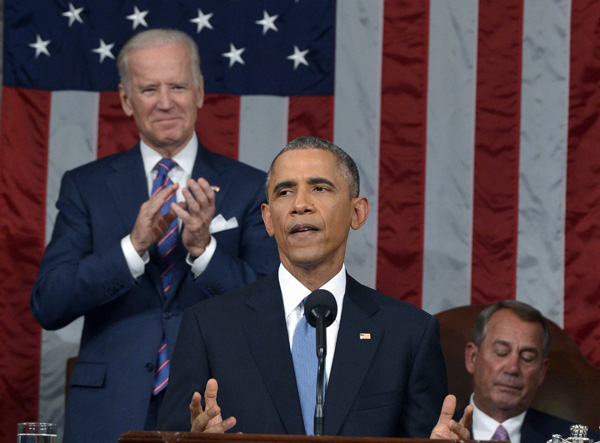 |
|
US President Barack Obama delivers his State of the Union address to a joint session of Congress on Capitol Hill in Washington, January 20, 2015. [Photo/Agencies] |
The sixth State of the Union address of US President Barack Obama deepened the political divide in Washington, which now reflects the country's economic divide and which, in turn, will reflect across the US foreign policy, including US-China relations, in the coming years.
Intriguingly, Obama mentioned China explicitly barely three times in his speech: in the context of the US' trade in Asia, jobs in America, and the climate deal signed with Beijing in November.
While the new climate targets have further divided US Congress, Obama's "pivot to Asia" policy has polarized US-China relations in Asia. China sees the "pivot" as a containment policy by another name, and Obama's view is very different: "China wants to write the rules for the world's fastest-growing region. That would put our workers and businesses at a disadvantage ... We should write those rules."
These remarks reflect the US president's efforts to speed up the proposed Trans-Pacific Partnership agreement, which includes several major Asian economies (but excludes China), ASEAN member states, Latin American countries, and members of the North American Free Trade Agreement (US, Canada and Mexico).
At the Asia-Pacific Economic Cooperation week in Beijing in November, China advocated a Free Trade Area of Asia-Pacific, a plan which was initially developed in Washington and which would include the US and China both. Nevertheless, US Trade Representative Michael Froman is seeking the support of US Congress for the TPP, for which Obama will ask for trade promotion authority.
The White House seeks to avoid a double-whammy, that is, the scenario in which Obama fails to complete the TPP in Asia or the Transatlantic Trade and Investment Partnership in Europe, or both. Since this would effectively undermine Obama's legacy, the US administration is pushing aggressively both deals - at the expense of substantial dilution in the final agreements.
On economic and trade issues, the subtext of bilateral relations has shifted thanks to China's reforms, the rapid rise of Chinese foreign direct investment in the US and efforts to accelerate innovation-led competitiveness. Instead of these areas of progress, Obama's State of the Union address made implicit allusions to China, particularly in context of cyber threats. And although there has been some progress in military-to-military ties on the bilateral security front, deep bilateral differences remain over cyber activities.

I’ve lived in China for quite a considerable time including my graduate school years, travelled and worked in a few cities and still choose my destination taking into consideration the density of smog or PM2.5 particulate matter in the region.